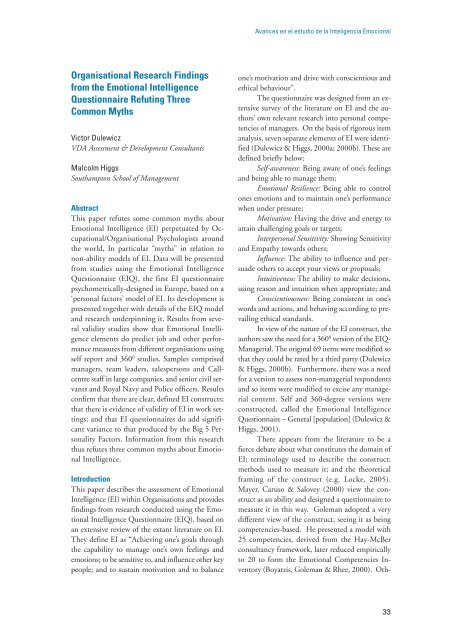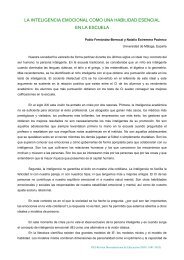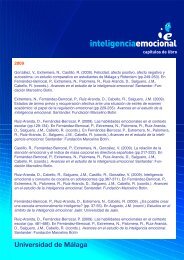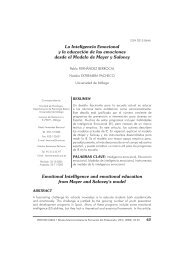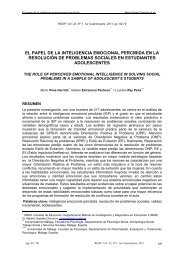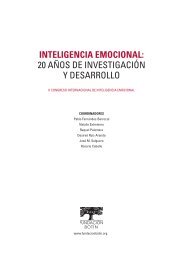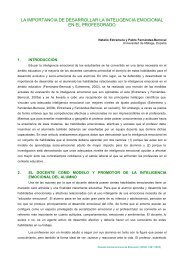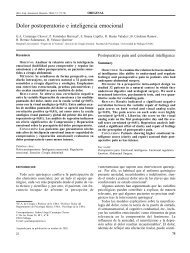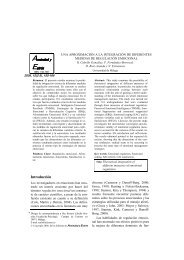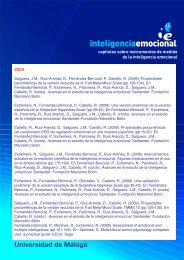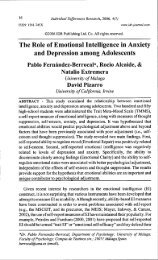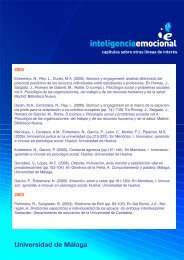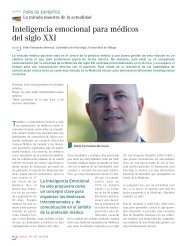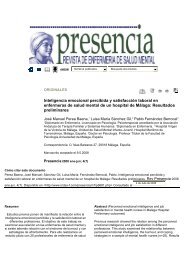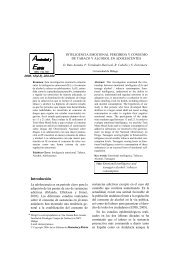Avances en el estudio de la Inteligencia Emocional
Avances en el estudio de la Inteligencia Emocional
Avances en el estudio de la Inteligencia Emocional
Create successful ePaper yourself
Turn your PDF publications into a flip-book with our unique Google optimized e-Paper software.
<strong>Avances</strong> <strong>en</strong> <strong>el</strong> <strong>estudio</strong> <strong>de</strong> <strong>la</strong> Int<strong>el</strong>ig<strong>en</strong>cia <strong>Emocional</strong><br />
Organisational Research Findings<br />
from the Emotional Int<strong>el</strong>lig<strong>en</strong>ce<br />
Questionnaire Refuting Three<br />
Common Myths<br />
Victor Dulewicz<br />
VDA Assessm<strong>en</strong>t & Dev<strong>el</strong>opm<strong>en</strong>t Consultants<br />
Malcolm Higgs<br />
Southampton School of Managem<strong>en</strong>t<br />
Abstract<br />
This paper refutes some common myths about<br />
Emotional Int<strong>el</strong>lig<strong>en</strong>ce (EI) perpetuated by Occupational/Organisational<br />
Psychologists around<br />
the world, In particu<strong>la</strong>r “myths” in r<strong>el</strong>ation to<br />
non-ability mod<strong>el</strong>s of EI. Data will be pres<strong>en</strong>ted<br />
from studies using the Emotional Int<strong>el</strong>lig<strong>en</strong>ce<br />
Questionnaire (EIQ), the first EI questionnaire<br />
psychometrically-<strong>de</strong>signed in Europe, based on a<br />
‘personal factors’ mod<strong>el</strong> of EI. Its <strong>de</strong>v<strong>el</strong>opm<strong>en</strong>t is<br />
pres<strong>en</strong>ted together with <strong>de</strong>tails of the EIQ mod<strong>el</strong><br />
and research un<strong>de</strong>rpinning it. Results from several<br />
validity studies show that Emotional Int<strong>el</strong>lig<strong>en</strong>ce<br />
<strong>el</strong>em<strong>en</strong>ts do predict job and other performance<br />
measures from differ<strong>en</strong>t organisations using<br />
s<strong>el</strong>f report and 360 0 studies. Samples comprised<br />
managers, team lea<strong>de</strong>rs, salespersons and Callc<strong>en</strong>tre<br />
staff in <strong>la</strong>rge companies, and s<strong>en</strong>ior civil servants<br />
and Royal Navy and Police officers. Results<br />
confirm that there are clear, <strong>de</strong>fined EI constructs;<br />
that there is evid<strong>en</strong>ce of validity of EI in work settings;<br />
and that EI questionnaires do add significant<br />
variance to that produced by the Big 5 Personality<br />
Factors. Information from this research<br />
thus refutes three common myths about Emotional<br />
Int<strong>el</strong>lig<strong>en</strong>ce.<br />
Introduction<br />
This paper <strong>de</strong>scribes the assessm<strong>en</strong>t of Emotional<br />
Int<strong>el</strong>lig<strong>en</strong>ce (EI) within Organisations and provi<strong>de</strong>s<br />
findings from research conducted using the Emotional<br />
Int<strong>el</strong>lig<strong>en</strong>ce Questionnaire (EIQ), based on<br />
an ext<strong>en</strong>sive review of the extant literature on EI.<br />
They <strong>de</strong>fine EI as “Achieving one’s goals through<br />
the capability to manage one’s own fe<strong>el</strong>ings and<br />
emotions; to be s<strong>en</strong>sitive to, and influ<strong>en</strong>ce other key<br />
people; and to sustain motivation and to ba<strong>la</strong>nce<br />
one’s motivation and drive with consci<strong>en</strong>tious and<br />
ethical behaviour”.<br />
The questionnaire was <strong>de</strong>signed from an ext<strong>en</strong>sive<br />
survey of the literature on EI and the authors’<br />
own r<strong>el</strong>evant research into personal compet<strong>en</strong>cies<br />
of managers. On the basis of rigorous item<br />
analysis, sev<strong>en</strong> separate <strong>el</strong>em<strong>en</strong>ts of EI were id<strong>en</strong>tified<br />
(Dulewicz & Higgs, 2000a; 2000b). These are<br />
<strong>de</strong>fined briefly b<strong>el</strong>ow:<br />
S<strong>el</strong>f-awar<strong>en</strong>ess: Being aware of one’s fe<strong>el</strong>ings<br />
and being able to manage them;<br />
Emotional Resili<strong>en</strong>ce: Being able to control<br />
ones emotions and to maintain one’s performance<br />
wh<strong>en</strong> un<strong>de</strong>r pressure;<br />
Motivation: Having the drive and <strong>en</strong>ergy to<br />
attain chall<strong>en</strong>ging goals or targets;<br />
Interpersonal S<strong>en</strong>sitivity: Showing S<strong>en</strong>sitivity<br />
and Empathy towards others;<br />
Influ<strong>en</strong>ce: The ability to influ<strong>en</strong>ce and persua<strong>de</strong><br />
others to accept your views or proposals;<br />
Intuitiv<strong>en</strong>ess: The ability to make <strong>de</strong>cisions,<br />
using reason and intuition wh<strong>en</strong> appropriate; and<br />
Consci<strong>en</strong>tiousness: Being consist<strong>en</strong>t in one’s<br />
words and actions, and behaving according to prevailing<br />
ethical standards.<br />
In view of the nature of the EI construct, the<br />
authors saw the need for a 360 0 version of the EIQ-<br />
Managerial. The original 69 items were modified so<br />
that they could be rated by a third party (Dulewicz<br />
& Higgs, 2000b). Furthermore, there was a need<br />
for a version to assess non-managerial respond<strong>en</strong>ts<br />
and so items were modified to excise any managerial<br />
cont<strong>en</strong>t. S<strong>el</strong>f and 360-<strong>de</strong>gree versions were<br />
constructed, called the Emotional Int<strong>el</strong>lig<strong>en</strong>ce<br />
Questionnaire – G<strong>en</strong>eral [popu<strong>la</strong>tion] (Dulewicz &<br />
Higgs, 2001).<br />
There appears from the literature to be a<br />
fierce <strong>de</strong>bate about what constitutes the domain of<br />
EI; terminology used to <strong>de</strong>scribe the construct;<br />
methods used to measure it; and the theoretical<br />
framing of the construct (e.g. Locke, 2005).<br />
Mayer, Caruso & Salovey (2000) view the construct<br />
as an ability and <strong>de</strong>signed a questionnaire to<br />
measure it in this way. Goleman adopted a very<br />
differ<strong>en</strong>t view of the construct, seeing it as being<br />
compet<strong>en</strong>cies-based. He pres<strong>en</strong>ted a mod<strong>el</strong> with<br />
25 compet<strong>en</strong>cies, <strong>de</strong>rived from the Hay-McBer<br />
consultancy framework, <strong>la</strong>ter reduced empirically<br />
to 20 to form the Emotional Compet<strong>en</strong>cies Inv<strong>en</strong>tory<br />
(Boyatzis, Goleman & Rhee, 2000). Oth-<br />
33


